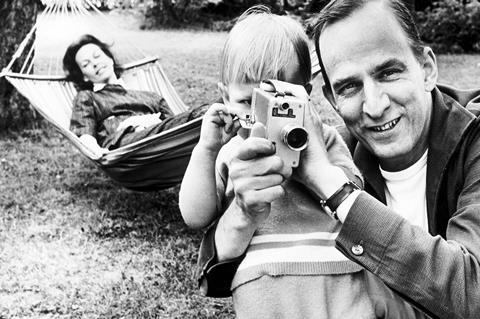Margarethe Von Trotta makes a personal ode to the Swedish master

Dir Margarethe Von Trotta. Germany, France. 2018. 99 mins
Margarethe Von Trotta’s many personal connections to Ingmar Bergman lend a fresh, distinctive flavour to Searching For Ingmar Bergman. The documentary explores and champions Bergman’s artistic legacy but also captures a very human portrait of a complex man. Released in the year that marks the centenary of Bergman’s birth, the film is essential viewing for cinephiles and ideal for arts channels, retrospectives and other commemorative events.
The surprise element of the film is the amount of archive footage featuring Bergman himself
Von Trotta begins her search by recalling a cold, grey Paris in 1960 when she was dragged along to the cinema to watch Bergman’s The Seventh Seal. It was to prove formative in shaping her own aspirations as a filmmaker and marked the beginning of a lifelong connection to Bergman and his work. She came to know him during his time in Germany in the 1970s. When Bergman chose his eleven favourite films for the Goteborg Film Festival in 1994, alongside La Strada, Rashomon and his beloved The Phantom Carriage was Von Trotta’s The German Sisters (1981).
Searching For Ingmar Bergman largely dispenses with a conventional biographical structure and assumes a fair degree of prior knowledge or interest from the viewer. There are generous clips from his most famous works and familiar elements in discussions around his recurring themes of faith, guilt and dark nights of the soul.
Everyone that Von Trotta meets and interviews has their own connection to Bergman whether as a family member, collaborator or admirer. Their testimony really serves to bring him alive as son Daniel Bergman cheerfully notes the contradictions in a man so attuned to the events in his own childhood yet so hopeless in dealing with his own children. Bergman’s producer Katinka Farago recalls the advice before their first meeting that “if he stares at you, stare back. If he spits at you, spit back.” They were to work together for thirty years.
The documentary is a treasure trove of insight, telling details and great stories. We learn that Bergman liked a working temperature of twelve degrees during rehearsals for a play, that he felt more at home in the theatre than on a film set and that he refused an offer of primal therapy as it might have diminished his creative powers.
Von Trotta’s journey from Paris to Stockholm and Bergman’s island Fårö includes an impressive roll call of interviews with Liv Ullmann, Olivier Assayas, Carlos Saura, Jean-Claude Carriere, actors Rita Russek, Julia Dufvenius and Gaby Dohm. All of them add a little colour or texture to the bigger picture with Assayas eloquently discussing the modernity of Bergman’s work, his groundbreaking desire to focus on liberated, multifaceted female characters and an enthusiasm for experimentation that lasted until his final feature Saraband (2003).
The surprise element of the film is the amount of archive footage featuring Bergman himself rehearsing, filming or speaking at a Los Angeles press conference in 1976. Who knew that there were so many interviews with Bergman in which his rather cool, gloomy image melts away in the face of footage that shows him as a thoughtful, charming figure who smiles a good deal.
Searching For Ingmar Bergman makes the case for a re-evaluation of lesser regarded films such as From The Life Of The Marionettes (1980). It also leaves the impression that Bergman knew himself better than anyone. In one interview, he simply states: “I’m only trying to speak the truth about the human condition.”
Production companies: C-Films, Mondex & Cie
International sales: Cinema Management Group en@cinemamanagementgroup.com
Producers: Benjamin Seikel, Stephane Sorlat, Guy Amon, Konstanze Speidel
Screenplay: Margarethe Von Trotta, Felix Moeller
Editing: Bettina Böhler
Cinematography: Börres Weiffenbach
Featuring: Liv Ullmann, Ruben Östlund, Olivier Assayas
























